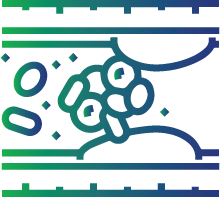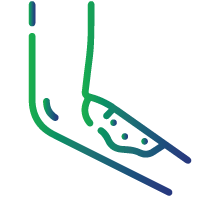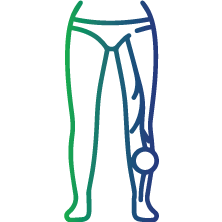
Protein C Activity
Protein C Activity
Protein C Activity test is used to measure protein C level in your blood. Protein C helps in the normal blood clotting process.
Having too little protein C (protein C deficiency), increases the risk of excessive blood clotting. Blood clotting issues can be extremely dangerous and even fatal. For instance, if a blood clot travels to the lungs it may cause pulmonary embolism (blocks blood flow in a lung artery).
Thus, getting a Protein C Activity test done is recommended to screen relatives of anyone with a known protein C deficiency. Additionally, it can be used to determine the cause of recurrent miscarriages
Symptoms of protein C deficiency:
If you have mild form of protein C deficiency, you may have:

Blood clots in your veins (deep vein thrombosis)
Symptoms in your new born having a severe form of protein C deficiency may manifest within hours of birth or within a few days. These symptoms include

Blood clots, mainly in blood vessels of the arms and legs

Abnormal bleeding in the affected areas

Large purple patches on the skin
Who should get tested?
It is recommended to take this test if an individual:

Has a history of blood clots

Has a family member who suffers from a protein C deficiency

Has a family member who suffers from a blood clotting disorder

Has abnormally clotting blood
Test preparation
No special preparation is required for a Protein C Activity test. Ensure your doctor is aware of what prescription drugs, over-the-counter medicines, or dietary supplements you are taking. Ask your doctor for details about pre-test preparations, and make sure to follow instructions closely
Interpretation of the Test Results
|
Protein |
Normal reference range |
|
Protein C |
Between 60% to 150% of clotting inhibition |
Deviation from normal levels indicate the following:
- Lower than normal level of protein C may be indicative of protein C deficiency and is caused due to blood-thinning medicines such as warfarin. Other factors include kidney problems, liver disease, vitamin K deficiency, inherited protein C deficiency, and consumptive coagulopathy (a condition that causes the blood to clot too much)
FAQs
How is the sample collected for a Protein C Activity test?
A blood sample is taken from a vein in the arm using a fine needle. This procedure typically takes no longer than five minutes
What are the risks involved in Protein C Activity test?
This test involves negligible risk. There might be slight pain or tenderness around the site where the needle went in. Rarely, the site can become infected
What is the turnaround time (TAT) for the result of a Protein C Activity test?
Result of a Protein C Activity test is usually available within 5 days after sample collection. However, it could take longer at times
What factors can affect a Protein C Activity test result?
Consumption of anticoagulation medicines before the sample collection, long time use of antibiotics, birth control pills, and chemotherapy drugs might affect the Protein C Activity test result
Can protein C deficiency be inherited?
Yes, protein C deficiency can be inherited. A PROC (Protein C, Inactivator Of Coagulation Factors Va And VIIIa) gene mutation is associated with protein C deficiency
There is a 50% chance that the mutated gene will be passed down to a child of a couple in which one parent has a single PROC gene mutation. If that occurs, child will have a mild protein C deficiency.
There is a 25% chance that both copies of the mutation will be passed down to a child whose parents both have the PROC gene mutation. In that case, the newborn will be severely affected and will have a much lower level of protein C

